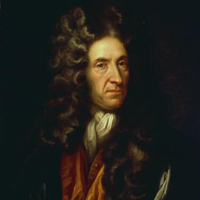The Myth of Robinson Crusoe
Michel Tourner rightly states that a myth is a story that everybody already knows. In English literature, there are mainly four defining heroes who set themselves as the myth of the modern world. They are; Don Quixote, Don Juan, Dr. Faustus and Robinson Crusoe. The stories, the characters, the language they speak and the culture are common and often meet with the situation of the people.

Daniel Defoe
Don Quixote symbolically represents the generosity and the limiting blindness of chivalric idealism. Don Juan mythically stands for the view of boundless experience of women. Doctor Faustus is a symbol of unquenched thirst of knowledge and Robinson Crusoe is a myth of the prudential quest for economic gain.
The myth of "Robinson Crusoe" is analogous to the bourgeois myth. Crusoe's story about his twenty eight years life on an island is full of mythic charms. There is one class of people for whom the story of "Robinson Crusoe" can assume a timeless value. This class is the class of bourgeois people. The 18th century bourgeois people find the projection of their assumptions and belief systems in Robinson Crusoe's life on a hitherto uninhabited island for twenty eight years.
Crusoe worked hard when he was left in the lurch on a hitherto uninhabited island. He believed in the emancipatory power of hard work. Work-ethics become the motivating factor in his lonely life entrapped in the wildness of the island. Sometimes he used to feel terribly sad, he used to stop working he used to become nervous. In the fit of his extreme sadness he used to interrogate the divine will. He used to contemplate on how the divine will operates. At the moment of serious contemplation, he used to console him preordained cause, divine cause behind my entrapped Island-life in loneliness and isolation. It is work and work alone that I can understand the mystery of the operation of the divine providence. After this kind of contemplation Robinson Crusoe used to work.
This work-ethics of Crusoe strongly attracted the bourgeois class. It is through hard-work and rational style of taking precautionary measures that Robinson Crusoe succeeded in taming this wild island. Behind Crusoe's successful civilizing mission lies the secret of the rational bent of mind and the continuously organized martial power, gun power. The power of reason and the power of gun enabled Robinson Crusoe to assert dominion over the island. Moreover, his protestant faith in God encouraged him to be loyal to the work-ethnics he clung strictly. These aspects of Crusoe's life on the island bear timeless significance. The bourgeois class and the class of people who undertake the project of colonialism have jointly seen the timeless value and significance in the story of Robinson Crusoe. Hence If "The Robinson Crusoe" is the myth, it is the myth, of the basic secret of success. One step ahead it is the myth which is central to the bourgeois class and the class of people who tend to colonize through conquest.
